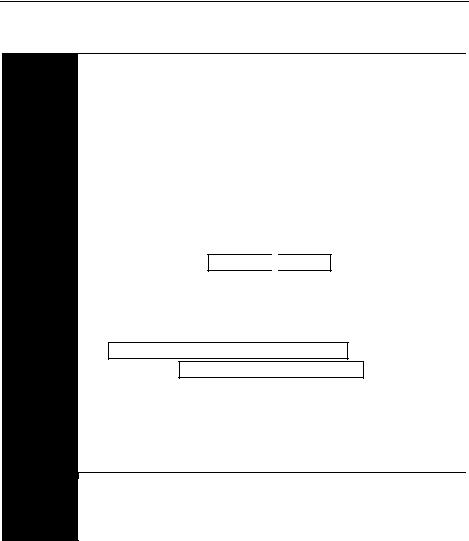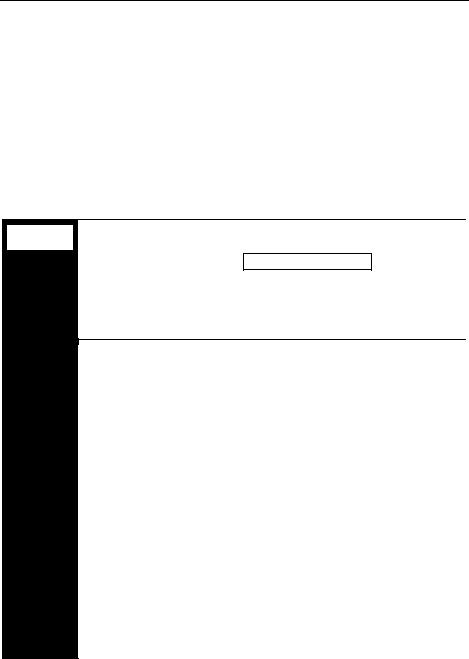
LAW / Referencing for Law Students / AGLC 3rd ed
.pdf
160
10International Arbitral and Tribunal Decisions
10.1State–State Decisions
10.1.1Reported Decisions
|
|
|
|
Expropriated |
(France v |
(Awards) |
(1932) 2 Hag Crt |
|
|
|
|
Example |
|
Religious |
Portugal) |
Rep 2d (Scott) |
1 |
, 4 |
|
|
|
|
|
Properties |
|
|
|
|
|
|
|
|
|
|
Parties’ |
|
Year, Volume |
Starting |
Pin- |
|
|
Element |
|
Case Name |
Phase |
and Report |
|||
|
|
|
Names |
Page |
point |
||||
|
|
|
|
|
|
Series |
|||
|
|
|
|
|
|
|
|
|
|
|
|
|
|
|
|
|
|
|
|
Rule State–state arbitral and tribunal decisions published in a report series should be cited in accordance with rule 9.2, as shown above. In particular:
•the case name should adhere to rule 9.2.1;
•the phase should adhere to rule 9.2.3; and
•pinpoint references should adhere to rule 9.2.7.
However:
•the parties’ names should appear in the conventional shortened form, not the full elaborate form, regardless of how they appear on the decision;
•the year, volume and report series should adhere to rules 2.2– 2.3; and
•the starting page should adhere to rule 2.4.
Judges’ or arbitrators’ names should be included in accordance with rule 9.2.8 (so should appear only after pinpoint references to separate or dissenting opinions or declarations). However, tribunal members may be referred to by a title other than ‘Mr’ or ‘Ms’ (such as ‘Dr’, ‘Prof’, etc).

Australian Guide to Legal Citation 161
Examples Cordillera of the Andes Boundary (Argentina v Chile) (Report of the Tribunal Appointed by the Arbitrator) (1902) 9 RIAA 39.
Southern Bluefin Tuna (Australia v Japan) (Jurisdiction and Admissibility) (2000) 39 ILM 1359. [Not: … (Australia and New Zealand v Japan) …]
Responsibility for the Death of Letelier and Moffitt (United States of America v Chile) (Decision) (2005) 25 RIAA 1, 12–13 (Prof Orrego Vicuña).
Notes Some commonly cited report series containing state–state arbitral decisions are the Arb Mat, Hague Ct Rep (Scott), Hague Ct Rep 2d (Scott), ILR and RIAA. In accordance with rule 2.3.2, the abbreviations for report series should appear as they do in the Appendix to this Guide.
Where an otherwise unreported case is published in the International Legal Materials (abbreviated ‘ILM’), the ILM should be cited.
10.1.2Unreported Decisions
|
|
|
|
Hoshin- |
(Japan v |
(Judg- |
(International |
|
6 |
|
|
|
|
|
Tribunal for |
Case No |
|
||||
|
|
Example |
|
August |
[1] |
|||||
|
|
|
|
maru |
Russia) |
ment) |
the Law of |
14, |
2007) |
|
|
|
|
|
|
|
|
the Sea, |
|
|
|
|
|
|
|
|
|
|
|
|
|
|
|
|
|
|
|
|
|
|
|
|
|
|
|
|
|
|
|
|
Name of |
|
|
|
|
|
Element |
|
Case |
Parties’ |
Phase |
Arbitral |
Case |
Full |
Pin- |
|
|
|
Name |
Names |
Body or |
Number |
Date |
point |
||
|
|
|
|
|
||||||
|
|
|
|
|
|
|
Tribunal |
|
|
|
|
|
|
|
|
|
|
|
|
|
|
Rule Unreported state–state arbitral and tribunal decisions should be cited as shown above.
The case name and phase should adhere to rules 9.2.1 and 9.2.3. The parties’ names should appear in the conventional shortened form, not the full elaborate form, regardless of how they appear on the decision. The name of the arbitral body or tribunal should appear as it does on the title page of the decision (or, where cumbersome, in a conventional shortened form).
Arbitral Int
Decisions

162 Part IV — International Materials
A case number should be included only if it appears in the decision. It should appear as it does on the title page, preceded by ‘Case No’ (in accordance with rule 8.2.10). If there is no full date, as much of the full date as appears should be included.
Pinpoint references should adhere to rules 1.1.5–1.1.6. Where a decision has paragraph numbers, pinpoints should be to paragraph numbers. Where a decision has only page numbers, pinpoints should be to page numbers.
Judges’ or arbitrators’ names should be included after pinpoint references in accordance with rule 9.2.8 (so should appear only after pinpoint references to separate or dissenting opinions or declarations).
Examples Access to Information under Article 9 of the Ospar Convention (Ireland v United Kingdom) (Final Award) (Permanent Court of Arbitration, 2 July 2003) [146].
Maritime Boundary (Barbados v Trinidad and Tobago) (Award)
(UNCLOS Arbitral Tribunal, 11 April 2006) [198]. [Not: … (Arbitral Tribunal Constituted Pursuant to Article 287, and in Accordance with Annex VII, of the United Nations Convention on the Law of the Sea, …]
Ports — Ethiopia’s Claim 6 (Ethiopia v Eritrea) (Final Award)
(Eritrea Ethiopia Claims Commission, 19 December 2005) [26].
10.2Individual–State Decisions (including Investor– State Decisions)
10.2.1Reported Decisions
|
|
Example |
|
Olguín v Paraguay |
(Jurisdiction) |
(2004) 6 ICSID |
154 |
, 158 |
|
|
|
Rep |
|||||
|
|
|
|
|
|
|
|
|
|
|
|
|
|
|
|
|
|
|
|
|
|
|
|
Year, Volume |
Starting |
Pin- |
|
|
Element |
|
Parties’ Names |
Phase |
and Report |
||
|
|
|
Page |
point |
||||
|
|
|
|
|
|
Series |
||
|
|
|
|
|
|
|
|
|
|
|
|
|
|
|
|
|
|

Australian Guide to Legal Citation 163
Rule Reported individual–state arbitral and tribunal decisions should be cited as shown above. Parties’ names should adhere to rule 2.1. The phase should adhere to rule 9.2.3. The year, volume and report series should adhere to rules 2.2–2.3. The starting page should adhere to rule 2.4.
Pinpoint references should adhere to rule 9.2.7. Judges’ or arbitrators’ names should be included after pinpoint references in accordance with rule 9.2.8 (so should appear only after pinpoint references to separate or dissenting opinions or declarations).
Examples Chas T Main International Inc v Mahab Consulting Engineers Inc (Award) (1983) 3 Iran–US CTR 270.
Southern Pacific Properties (Middle East) Ltd v Egypt (Decision on Jurisdiction of 27 November 1985) (1983) 3 ICSID Rep 112, 129–30.
Azurix Corporation v Argentina (Jurisdiction) (2004) 43 ILM 262, 282.
Notes Some commonly cited report series containing investor–state arbitral decisions are the Iran–US CTR and ICSID Rep. In accordance with rule 2.3.2, the abbreviations for report series should appear as they do in the Appendix to this Guide.
Disputes between individuals and international organisations (in international fora applying international law) should also be cited in accordance with this rule or rule 10.2.2.
10.2.2Unreported Decisions
|
|
|
|
Enron |
(Juris- |
(ICSID |
Case No |
14 January |
|
|
|
Example |
|
Corporation |
Arbitral |
[39] |
|||
|
|
|
diction) |
ARB/01/3, |
2004) |
||||
|
|
|
|
v Argentina |
|
Tribunal, |
|
|
|
|
|
|
|
Parties’ |
|
Name of |
Case |
|
Pin- |
|
|
Element |
|
Phase |
Arbitral Body |
Full Date |
|||
|
|
|
Names |
Number |
point |
||||
|
|
|
|
|
|
or Tribunal |
|
|
|
Rule Unreported individual–state arbitral and tribunal decisions should be cited as shown above.
Arbitral Int
Decisions

164 Part IV — International Materials
Parties’ names should adhere to rule 2.1. A phase should be included only if it appears in the decision. The name of the arbitral body or tribunal, case number and full date should adhere to rule 10.1.2.
Pinpoint references should adhere to rules 1.1.5–1.1.6. Where a decision has paragraph numbers, pinpoints should be to paragraph numbers. Where a decision has only page numbers, pinpoints should be to page numbers.
Judges’ or arbitrators’ names should be included after pinpoint references in accordance with rule 9.2.8 (so should appear only after pinpoint references to separate or dissenting opinions or declarations).
Examples Re Polystyrene and Impact Crystal from the United States of America (United States of America v Mexico) (Panel Decision) (North American Free Trade Agreement Chapter 19 Panel, Case No MEX- 94-1904-03, 12 September 1996).
Keeney v Secretary-General of the United Nations (United Nations Administrative Tribunal, Judgement No 6, 4 September 1951).
Phoenix Action Ltd v Czech Republic (Award) (ICSID Arbitral Tribunal, Case No ARB/06/5, 15 April 2009) [54].
Trans-Global Petroleum Inc v Jordan (Consent Award) (ICSID Arbitral Tribunal, Case No ARB/07/25, 8 April 2009) [12].
CMS Gas Transmission Co v Argentina (Annulment) (ICSID Arbitral Tribunal, Case No ARB/01/8, 25 September 2007) [158]–[159].
Tokelés v Ukraine (Jurisdiction) (ICSID Arbitral Tribunal, Case No ARB/02/18, 29 April 2004) [27] (President Weil).
10.3Subsequent References
Rule ‘Ibid’ should be used for all materials in this chapter (in accordance with rule 1.4.1).

Australian Guide to Legal Citation 165
Other subsequent references should adhere to rule 2.14. In accordance with rule 2.14, it may be necessary to give an international arbitral or tribunal decision a short title incorporating its phase to distinguish it from other decisions with the same parties.
‘Above n’ should not be used for any materials in this chapter.
Examples 17 Boundary Dispute between India and Pakistan Relating to the Interpretation of the Report of the Bengal Boundary Commission, 12 and 13 August 1947 (India v Pakistan) (Decisions) (1997) 21 RIAA 3, 13 (‘Boundary Dispute (Decisions)’).
18 Ibid 16.
…
27 Boundary Dispute (Decisions) (1997) 21 RIAA 3, 15.
Arbitral Int
Decisions

166
11International Criminal Tribunals and Courts
11.1Basic Documents
11.1.1Constitutive Documents
Rule Constitutive documents of international criminal tribunals and courts should be cited in accordance with the appropriate rules of this Guide for the source type.
Where the constitutive document of an international criminal tribunal or court was (partly) created by a UN Security Council resolution, an appropriate short title (usually that of the instrument or an abbreviated version) should be included in accordance with rules 8.5 or 8.2.12 after the initial citation to the resolution or the relevant annex (for example, ‘Statute of the International Tribunal for Rwanda’). Subsequent references should appear in the form:
Short Title 
 Pinpoint .
Pinpoint .
Where an amendment is important, or where it is important to indicate the state of a constitutive document at a particular point in time, the amending instrument should be included in the form:
Citation to Original Constitutive Document , as amended by
Citation to Amending Instrument .
Where this is the first reference to a constitutive document, the short title should appear after the citation to the amending instrument.
Pinpoint references should adhere to rule 7.5 and should generally be to articles and paragraphs.
Examples 22 Rome Statute of the International Criminal Court, opened for signature 17 July 1998, 2187 UNTS 90 (entered into force 1 July 2002).

Australian Guide to Legal Citation 167
23SC Res 955, UN SCOR, 49th sess, 3453rd mtg, UN Doc S/RES/955 (8 November 1994) annex (‘Statute of the International Tribunal for Rwanda’).
…
25Statute of the International Criminal Tribunal for Rwanda art 2.
26SC Res 827, UN SCOR, 48th sess, 3217th mtg, UN Doc S/RES/827 (25 May 1993), as amended by SC Res 1877, UN SCOR, 64th sess, 6155th mtg, UN Doc S/RES/1877 (7 July 2009) (‘ICTY Statute’).
27Agreement between the United Nations and the Government of Sierra Leone on the Establishment of a Special Court for Sierra Leone, signed 16 January 2002, 2178 UNTS 137 (entered into force 12 April 2002) annex (‘Statute of the Special Court for Sierra Leone’).
11.1.2Rules
|
Rule |
|
The rules of international criminal tribunals and courts should be cited |
|||||||||||
|
|
|
as follows: |
|
|
|
|
|
|
|||||
|
|
|
|
|
|
|
, |
|
|
|
|
|
, |
|
|
|
|
|
|
Name of Tribunal or Court |
|
Title of Rules |
|||||||
|
|
|
Doc No |
|
|
(adopted |
|
|
) |
|
. |
|||
|
|
|
|
Document Number |
Full Date |
Pinpoint |
||||||||
|
|
|
A document number should be included only where it appears on the |
|||||||||||
|
|
|
rules. It should be preceded by ‘Doc No’ and adhere to rule 8.2.10. |
|||||||||||
|
|
|
Where rules have been revised, the full date should be the date of |
|||||||||||
|
|
|
adoption of the revision. |
|
|
|
|
|
|
|||||
|
|
|
Pinpoint references should adhere to rule 7.5 and should generally be |
|||||||||||
|
|
|
to rules and sub-rules. |
|
|
|
|
|
|
|||||
|
|
|
|
|
|
|
|
|
|
|
|
|
|
|
|
Examples |
|
International Criminal Court, Rules of Procedure and Evidence, Doc |
|||||||||||
|
|
|||||||||||||
|
|
|
No ICC-ASP/1/3 (adopted 9 September 2002) r 74. |
|||||||||||
|
|
|
||||||||||||
Extraordinary Chambers in the Courts of Cambodia, Internal Rules (Ver 4) (adopted 11 September 2009) r 23.
Crim Int
Tribunals

168 Part IV — International Materials
11.2Cases
|
|
Prosecutor |
(Sentencing |
(Special |
Trial |
Case No |
|
|
|
|
Court for |
8 April |
|
||||
|
Example |
Chamber |
SCSL-04- |
[12] |
||||
|
v Sesay |
Judgement) |
Sierra |
2009) |
||||
|
|
|
|
Leone, |
I, |
15-T, |
|
|
|
|
|
|
|
|
|
|
|
|
|
|
|
|
|
|
|
|
|
Element |
Parties’ |
Phase |
Court |
Chamber |
Case |
Full |
Pin- |
|
Names |
Number |
Date |
point |
||||
|
|
|
|
|
||||
|
|
|
|
|
|
|
|
|
|
Rule |
11.2.1 |
11.2.2 |
11.2.3 |
11.2.4 |
11.2.5 |
11.2.6 |
11.2.7 |
|
|
|
|
|
|
|
|
|
11.2.1Parties’ Names
Rule |
Parties’ names should appear in italics in the form: |
|
|
Prosecutor v Surname of Defendant
The order of the names should be reversed for appeals (if they are on the decision itself). Where there are multiple defendants or appellants, only the name of the first defendant or appellant should be included.
Examples Prosecutor v Nikolić (Sentencing Judgement) (International Criminal Tribunal for the Former Yugoslavia, Trial Chamber II, Case No IT-94- 2-S, 18 December 2003).
Prosecutor v Lubanga (Decision on the Manner of Questioning Witnesses by the Legal Representatives of Victims) (International Criminal Court, Trial Chamber I, Case No ICC-01/04-01/06-2127, 16 September 2009) [6]. [Not: Situation in the Democratic Republic of the Congo in the Case of the Prosecutor v. Thomas Lubanga Dyilo …]
Simba v Prosecutor (Judgement) (International Criminal Tribunal for Rwanda, Appeals Chamber, Case No ICTR-01-76-A, 27 November 2007) [40]–[41].
Prosecutor v Prlić (Decision on Defence Motion to Reopen Its Case)
(International Criminal Tribunal for the Former Yugoslavia, Trial Chamber III, Case No IT-04-74-T, 3 July 2009). [Not: The Prosecutor v Jadranko Prlić, Bruno Stojić, Slobodan Praljak, Milivoj Petković, Valentin Ćorić, Berislav Pušić … nor Prosecutor v Prlić et al …]

Australian Guide to Legal Citation 169
11.2.2Phase
Rule The phase should appear enclosed in parentheses and in italics. Capitalisation should adhere to rule 1.7. The phase should be included as it appears on the judgment (including any date in the name of the phase). However, the defendant’s name should be omitted from the phase if the name is included in accordance with rule 11.2.1.
Examples Prosecutor v Blaškič (Decision on the Prosecution and Defence Motions Dated 25 January 1999 and 25 March 1999 Respectively)
(International Criminal Tribunal for the Former Yugoslavia, Trial Chamber I, Case No IT-95-14-T, 22 April 1999) 4.
Prosecutor v Al Bashir (Warrant of Arrest) (International Criminal Court, Pre-Trial Chamber I, Case No ICC-02/05-01/09-1, 4 March 2009). [Not: … (Warrant of Arrest for Omar Hassan Ahmad Al Bashir) …]
11.2.3Court
Rule The name of the court should be included in its commonly used shortened form (if any exists), not its full elaborate form.
Example Prosecutor v Karadžić (Decision on Prosecution Motion Seeking Determination that the Accused Understands English for the Purposes of the Statute and Rules of Procedure and Evidence)
(International Criminal Tribunal for the Former Yugoslavia, Trial Chamber III, Case No IT-95-5/18-PT-S, 26 March 2009) [6]. [Not: … (International Tribunal for the Prosecution of Persons Responsible for Serious Violations of International Humanitarian Law Committed in the Territory of the Former Yugoslavia since 1991, …]
11.2.4Chamber
Rule |
The name of the chamber should include both: |
|
|
•the type of chamber (where an international criminal tribunal or court has multiple types of chambers); and
Crim Int
Tribunals
